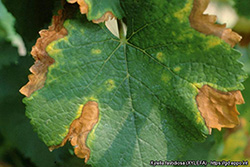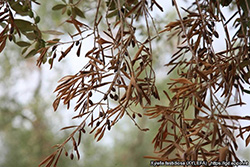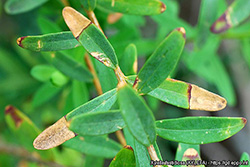
20th Meeting of the EPPO Panel on Diagnostics in Bacteriology
Maisons-Alfort (FR), 2016-06-01/02
The 20th meeting of the EPPO Panel on Diagnostics in Bacteriology () took place in the premises of the French Agency for Food, Environmental and Occupational Health & Safety (ANSES) in Maisons-Alfort, France. This additional meeting of the Panel was convened to be able to finalize the revision of PM 7/24 on Xylella fastidiosa. The Panel also took the opportunity to finalize two new Standards on Xanthomonas axonopodis pv. allii and Acidovorax citrulli and plan the revision of PM 7/21 Ralstonia solanacearum and PM 7/59 Clavibacter michiganensis subsp. sepedonicus.
|
|
|
|
|
Symptoms of Xylella fastidiosa on grapevine, olive and Polygala myrtifolia. |
||
Discussions on pest-specific diagnostic protocols
The Panel discussed the following diagnostic protocols:
- Xanthomonas axonopodis pv allii
The authors of the diagnostic protocol provided their responses to the comments gathered during country consultation. The Panel agreed that this new protocol should be sent for endorsement by the EPPO Working Party on Phytosanitary Regulations to be presented for Council approval. The protocol was approved in September 2016 and will be published in the December issue of the EPPO Bulletin.
- Acidovorax citrulli
The Standard has been developed in the framework of the EU-funded project ‘Seed health: development of seed treatment methods, evidence for seed transmission and assessment of seed health’ (TESTA). The authors of the diagnostic protocol provided their responses to the comments gathered during country consultation. The Standard includes a sweat box grow out test for seeds. It was agreed that it was important to specify in the protocol the lack of experience of using sweat boxes with certain types of Cucurbit seeds. The text on sample preparation was adjusted to take into account different procedures in use for isolation of the pathogen from vines. The Panel agreed that this new protocol should be sent for endorsement by the EPPO Working Party on Phytosanitary Regulations to be presented for Council approval. The protocol was approved in September 2016 and will be published in the December issue of the EPPO Bulletin.
- PM 7/21 Ralstonia solanacearum and PM 7/59 Clavibacter michiganensis subsp. sepedonicus
Following the presentations on real-time PCR tests available for the detection of Ralstonia solanacearum and Clavibacter michiganensis subsp. sepedonicus and on the results of the three EUPHRESCO ERA-Net interlaboratory tests, the Panel agreed on the tests to be included in the revision of the protocols for the two bacteria. Two Expert Working Groups are scheduled in August 2016 and January-February 2017 to allow experts to work on the revised diagnostic protocols.
- PM 7/24 Xylella fastidiosa
The diagnostic protocol was finalized and the comments received during country consultation were addressed. The Panel discussed the minimum number of tests needed to declare a sample negative and agreed that one test was sufficient. The Panel also discussed the fact that the terminology used in diagnostic protocols should not cause confusion with some management terminology. This terminology issue will be discussed further at the next Panel on Diagnostics and Quality Assurance. The Panel agreed that the revised protocol should be sent for the final stage of the fast-track approval procedure (formal objection stage). The protocol was adopted in July 2016 and will be published in the December issue of the EPPO Bulletin (already available early online).
General discussions
- Information to be provided on PCR equipment
A discussion was held on the need to provide information (name, producer, etc.) on PCR equipment used. The Panel suggested that the EPPO instruction to authors should be modified and only request the name of the equipment for real-time PCR.
- IPPC implementation pilot on surveillance
The IPPC implementation pilot project on surveillance and its objectives were presented. The EPPO Secretariat (co-leader of the work on Xylella fastidiosa) had been collecting documents that would support surveillance activities, pest risk assessment, pest risk management and emergency response planning etc. in the various countries and Panel members were invited to share any relevant national documents.
The next meeting will be held in Italy in May 2017.



